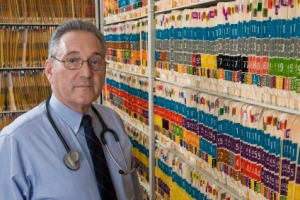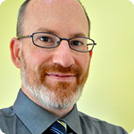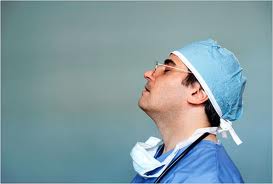What Is Your Future Of Medicine?
 We are holding ourselves back from visionary changes.
We are holding ourselves back from visionary changes.
The business of our practices and careers often gets in the way of our visionary thinking of the future. In medicine, this seems to be more true than other sectors of our society. Our medical practices of today closely resemble the medical practices of 20 or even 30 years ago.
For the most part, medical practices all look the same. The front door of the practice opens to a waiting room filled with some variety of magazines, chairs and a large glass window that separates the “practice” from the patients. Patients are called back to the exam room and pass through hallways that are narrow and poorly decorated with wallpaper or generic art on the wall. And the exam rooms all look and feel the same: poor natural light and a large exam table placed in the middle of the room.
As well, the process of the medical visit is largely unchanged from decades past. The doctor walks in, sits in her designated chair and speaks with the patient for a few minutes before performing a physical exam and writing prescriptions and/ or lab/x-ray orders. (On a side note, have you ever wondered why the lab report of today looks exactly like the lab report of decades ago? Hasn’t technology changed how we view data?)
We do this over and over. We have been doing this over and over the same way for way too long. One of the problems with figuring out how to create a better health care infa-structure is that we cannot get the current/old/tried-and-true medical visit model out of our brains. We are literally stuck here (and there) because we continually feel that the way we are practicing is the best way because that is how doctors practice medicine. Over and over and over.
I feel that we would do ourselves and our industry a service by throwing away this model and starting fresh. Let’s face it, the modern society we live in right now is very different than 20 years ago. Back then we did not even have the internet, the iPhone or Facebook. 20 years ago we communicated with our patients solely by face to face appointments in our offices. The same offices we are using now.
In order for us to truly make progress, then, we have to reinvent how medicine can be practiced. Here are six visions I have that will make for a better medical practice, improve patient outcome and boost physician job satisfaction (in order from the most practical to the most visionary):
1. Embrace the virtual visit: patients don’t have time anymore to drive through traffic and wait in our waiting rooms and exam rooms anymore. They have questions right now and we have the technology to embrace this. Ask all of your patients to get a Skype account and then offer virtual visits and charge the patient for this convenience. They will love it. And so will you.
2. Take down the glass: this is a pet-peeve of mine. The glass partition creates an immediate sense of imbalance in the waiting room. Far better is to create an open waiting room where patients feel on equal footing with the practice staff. Staff can be trained to communicate so HIPAA violations do not occur. Why not add a pinball machine and coffee bar? Add free WiFi. Make the waiting room a place where patients don’t mind waiting, but actually enjoy the break in their day.
3. Offer Home/ Work visits: This goes back to idea #1. Do you really need a central office anymore? Would you serve your time better by working from home and making periodic house calls while employing virtual visits most of the time? There is so much wasted time in the office. We get interrupted all the time with this phone call or that fax. Wouldn’t your own time be better served if you could focus on one thing at a time? This would certainly free up time to focus on the other aspects of your life and career that you enjoy pursuing. So much of the office is devoted to running the office that many times our own personal goals are left out.
4. Create a Social Health Network: right now this is the big push with out society--belonging, joining and participating in different social media outlets. I think this reflects our desires to connect first. The problem with many of the social media venues is that we end up reaching out as opposed to actually interacting. Facebook and Twitter are great for developing a fan base, but not so good at focusing on the fans. By creating a Social Health Network, we could each have our panels of patients that we could interact with in more of a community way. This would allow us to interact on the individual level and at the community level. Employing a Social Health Network would also allow our patients to interact with each other. I think that having more of a niche network is exactly what people are longing for--more personal and deeper connections.
5. Redesign Lab Reports: have you seen Flipboard on the iPad? This is where we need to move medicine communication. The visual information our current lab reports provide is so boring and plain. There is no visual dimension to these reports. Far better would be to generate digital reports that are fluid and are actually enjoyable for the patient to interact with. Right now we have trained our society to detest looking at their lab reports because they are boring and don’t provide any visual information. But what would happen if we created digital lab reports that were full of color and motion?
6. Merge our virtual health and real health worlds: We are raising our children in the digital era with great emphasis on the virtual world that trumps reality. Video games, streaming movies, iTunes music, apps, you get my point. So why not take advantage of this and create a virtual health world? Much like the Sims game, we could all create virtual profiles of ourselves that we “play around” with. With the advent of monitoring devices on our mobile phones (sleep cycles, heart rate variabilities, pedometers, etc.) it is now easy to access information about ourselves we never could before. We could stream that type of information to our virtual selves: it appears you have not reached deep sleep for 3 nights in a row--how about trying some Melatonin or Ambien? We would then watch what happens with our virtual selves when we tried this. By combining real data into a virtual world, we would be able to see how our bodies react and respond to different tweaks and changes. As doctors, we could then communicate with our virtual patients in this game-like world as well, providing an extra level of support. By combining our virtual and real worlds we would bring an element of fun and style that is currently missing in medical practice.
One of the major obstacles in reforming our health care system is that we are stuck using the same tried and true methods of practicing medicine. I think we will only be able to break through and create a better system for patients and ourselves when we scrap our impressions of how patients are seen and how we practice medicine.
So what are your visions for the future of medicine?
 Email This Article tagged:
Email This Article tagged:  Medical Innovation,
Medical Innovation,  flipboard,
flipboard,  future of medicine,
future of medicine,  iPad,
iPad,  social media,
social media,  virtual medicine |
virtual medicine |  Sep 10, 9:00 AM
Sep 10, 9:00 AM 







